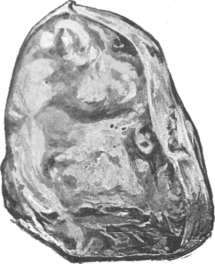Jagersfontein Mine

Jagersfontein Mine /ˌjeɪɡərzˈfɒnteɪn/ is an abandoned open-pit mine in South Africa located close to the town of Jagersfontein and about 110 kilometres (68 miles) south-west of Bloemfontein.[1][2] Since it was first established in 1870,[3][4] two of the ten biggest diamonds ever discovered, the Excelsior and the Reitz (now called the Jubilee), were mined from Jagersfontein.[2] The term "Jagers" has since been coined to denote the distinctive faint bluish tint of the gems from this mine.[5] Among geologists, Jagersfontein is known as a kimberlite pipe,[6] and a prime locality for mantle xenoliths, some of which are believed to have come from depths of 300–500 km (190–310 mi).[1]
About 9.6 million carats (1,900 kg) of jewel-quality diamonds were extracted during the mine's century of operation, interrupted only by the two World Wars and the Great Depression.[2] After thirty-nine years of open-pit mining, underground mining began in 1909, and continued until its eventual closure on May 28, 1971, less than a year after the centenary of the first diamond discovery in the area.[3][5] Since then, an Open Mine Museum and the Jagers Mining Village have opened as tourist attractions at the site.
Research by historian Steve Lunderstedt in 2005 confirmed that the mine was the biggest hand-excavated hole in the world at 19.65 hectares (48.6 acres), slightly larger than the Big Hole of 17 ha (42 acres) in Kimberley, which had claimed the title up to then. It is probably not the deepest, though, since the final depth of the Big Hole reached 220 m (720 ft) or more. Jagersfontein was dug by hand to a depth of 200 m (660 ft) by 1911.[7]
Currently, the mine area is closed to the public.[8][9]
External links
References
- 1 2 "Jagersfontein Mine, Jagersfontein, Free State Province, South Africa", Mindat.org
- 1 2 3 Jagersfontein, Places.co.za
- 1 2 Jagersfontein entry, Encyclopædia Britannica
- ↑ "Jagersfontein Mine", Showcaves.com
- 1 2 "The Excelsior Diamond", Famous, Historic and Notable Diamonds, Tripod.com
- ↑ Photograph showing the circular geometry of the Jagersfontein kimberlite, Department of Terrestrial Magnetism, Carnegie Institution of Washington
Stressed Pyroxenite Nodules from the Jagersfontein Kimberlite, G. D. Borley and P. Suddaby, Mineralogical Magazine; March 1975 v. 40; no. 309; p. 6-12; doi:10.1180/minmag.1975.040.309.02
Iron carbide and metallic inclusions in diamonds from Jagersfontein, A. P. Jones, D. Dobson, I. Wood, A. D. Beard, A. Verchovsky, H. J. Milledge, 9th International Kimberlite Conference Extended Abstract No. 9IKC-A-00360, 2008 - ↑ "Big Hole loses claim to fame", Hannatjie van der Merwe, News24.com, May 20, 2005
- ↑ Open Africa - Open Mine Jagersfonteign
- ↑ Community takes on Mining Giants - The Weekly, 8 August 2013
Coordinates: 29°45′55″S 25°25′8″E / 29.76528°S 25.41889°E